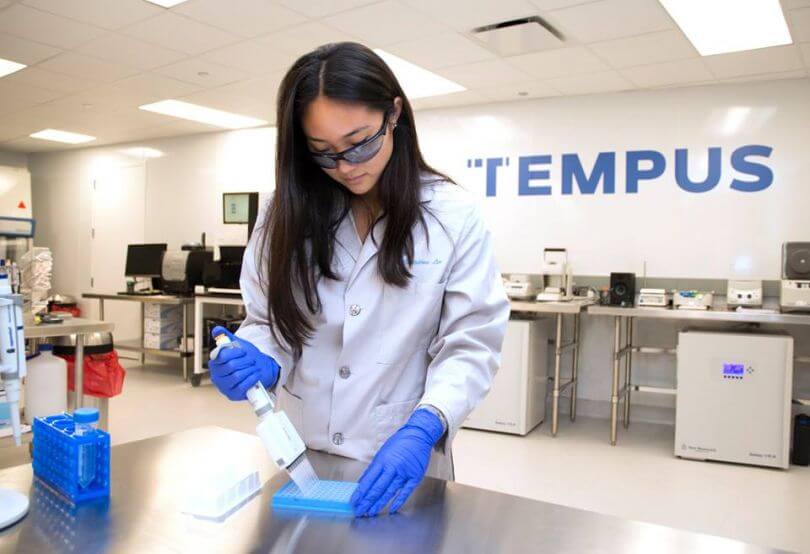In March of 2018, a unicorn was unleashed in the Windy City, in the guise of Tempus, a healthcare analytics firm. It was the $80M in funding secured the same month that put Tempus’s value at approximately $1.1B. In August 2018, Tempus raised a further $110M in Series E financing causing the company’s valuation to jump to $2B.
The healthcare analytics startup is looking to harness all this money for the greater good – to rid the world of cancer with personalized treatment through big data collection and analysis.
Building Personalized Clinical and Molecular Maps
It was in an interview with the Chicago Business, that co-founder and CEO, Eric Lefkofsky shared the story behind the genesis of Tempus. He explains that the idea came to him around the time his wife successfully fended off breast cancer, a few years ago.
At that juncture, he had focused all efforts on collecting relevant research material on the disease. And while struggling to find helpful information, he realized just how abysmal the physician’s and patient’s access to healthcare data was. It became clear that such a sorry state of affairs, pertaining to information accessibility, was preventing patients from knowing of the treatment options best suited to their particular case.
Lefkofsky noted that this scenario was very similar to how small-scale merchants used to struggle to leverage data until Groupon (which he co-founded) came along. Something had to be done to reduce this information gap, and to him, a data analytics-led solution was the answer. That’s why he launched Tempus in 2015 to aid in cancer research and clinical decision-making.
He launched Tempus in 2015 to aid in cancer research
Today, Tempus ‘sequences tumour genes and analyses clinical data from doctors, hospitals, and studies to standardize the information and analyze for patterns’ according to its website. To this end, Lefkofsky has built up a strong team of computational biologists, bioinformaticians, software engineers, data scientists, and mathematicians.
By marrying patients’ clinical information with genomic data gathered, Tempus helps physicians make real-time, data-driven decisions. Ultimately, the intent is for each patient’s cancer information to help all future cases.
So, if a patient comes in with a particular type and stage of cancer, the doctor can use Tempus to analyze his/her genetic information and determine what therapies have historically proven successful for others with similar genetic makeup.
“When you look at what’s happening to (patients) at a clinical level — what drugs they’re taking, what disease do they have … are they progressing or not progressing — when you combine that with what’s happening at a molecular level, you get this amazing library of data, where you can start to see these patterns emerge,” Lefkofsky mentioned in an interview with Blue Sky.
Collect. Store. Sequence. Analyze.

PC: Company website
The data collection process involves large volumes of unstructured data, consisting of hand-scrawled notes and prescriptions, which are analyzed and stored. The patient’s tumor and blood or saliva specimens are also taken to understand each individual’s genetic makeup. Then, it goes to Tempus’s state-of-the-art lab that sequences patient genes to determine which mutations affect an individual’s cancer.
Aggregation of all this data has resulted in Tempus having the world’s largest library of structured clinical and molecular data. It even tied up with CancerLinQ, a database of treatment results developed by the American Society of Clinical Oncology, to gain a further boost in the data department.
Also, Tempus has partnered with various hospitals and research centres to keeps track of how cancer patients respond to various treatments. 50 National Cancer Institute-designated cancer centres and 250 hospital systems and have already collected 2M+ clinical records (EHR), in partnership with Tempus.
Finally, thanks to advanced analytics and machine-learning algorithms Tempus is able to make sense of all this data and link genetic specifications to therapeutic histories.
But that’s not all, Tempus also offers image recognition and biological modelling services. Together, all these tools can really aid doctors in precision oncology and also deliver personalized and optimized medicine.
But how does this all translate to money for Tempus?
For one, drug companies pay for access to such data to improve drug development (with privacy concerns addressed). Also, researchers and hospital systems pay Tempus directly for its services. On the other hand, the patient’s insurance is billed in the case of physicians using the services.
Scaling up on the Healthcare Analytics
The existing market for cancer and tumour profiling is growing rapidly and is already has a hotbed of competition. So much so that the market size is expected to reach over $60B in the next five years.
Two other startups in the same space as Tempus, Flatiron Health and Foundation Medicine, were both bought out by pharma giant Roche at similar valuations. Another well-known biotech unicorn is Moderna Therapeutics, based out of Massachusetts, which focuses on creating treatments based on messenger RNA (mRNA) technology. And then, there is the San-Francisco-built Nebula Genomics which is a trusted marketplace for genomic and health data.
But what sets Tempus slightly apart from the competition is that it provides sequencing tests and biological modelling, apart from collecting clinical data about how patients respond to treatment.
Holistic offering established, the healthcare analytics company’s next conquest would be to increase their data collection efforts in terms of access to more hospitals and research bodies across the nation.
“We’re fairly far along. It starts with: Do you have proprietary access to data? Do you have the data pipes built? Do you have a platform to structure that data to generate the data you need? The third piece is you have to scale it and take it to market. We’re through the first two,” Lefkofsky reportedly told Chicago Business.
Tempus estimates that its platform currently reaches 25% of cancer patients in the US. The privately held company plans to use the money raised to expand operations and expand into new therapeutic areas (cardiovascular disease, diabetes) and geographies.
Groupon to Tempus – the Indomitable Mr.Lefkofsky

Co-founder and CEO, Eric Lefkofsky. PC: Company website
Even before Tempus, Lefkofsky had already established himself as a successful serial entrepreneur with several big wins in his kitty. And after leaving Groupon in Nov 2015, he has been primarily seen investing his time on Tempus. This suggests that the investor sentiment towards Tempus will remain quite positive, on the back of his reputation in the world of startups.
Also, if and when the healthcare analytics company becomes a big hit, to Lefkofsky it would not just be another notch on the wall of business success. Owing to his wife’s history with cancer and his philanthropic leanings, a favorable outcome for Tempus would also mean the satisfaction of seeing a very personal project attain fruition.
Eitherways, he seems to be ready to look at Tempus as an exciting healthcare analytics challenge. “I’m confident that in 5 or 10 years, the average oncologist will be connected to a system like Tempus. Whether or not it’s Tempus, it’s too soon to say,” Lefkofsky added.
Subscribe to our newsletter



